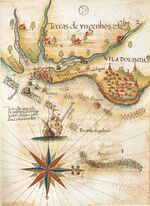Albarena
This article or section marked as work-in-progress has not been edited in over seven days, but further work is required. Please notify the user who first added this template. |
Glorious Republic of Albarena Albarena | |
|---|---|
| Capital | Vila Albarena |
| Largest city | Albarena |
| Official languages | Portuguese |
| Demonym(s) | Albareni |
| Government | Semi-presidentialist republic |
| Lucas van der Ley | |
• Premier | vacant |
| Establishment | |
• Fist talks | 30 November 2021 |
• Foundation | 25 May 2022 |
| Area | |
• Total | 0.2 km2 (0.077 sq mi) |
| Population | |
• 2022 estimate | 5 |
| HDI (2021) | high |
| Currency | Brazilian Digital Token (BRZ) |
| Time zone | BRT |
• Summer (DST) | BRT |
| Date format | dd/mm/yyyy |
| Driving side | right |
| Internet TLD | .ga |
| |
Albarena, officially the Glorious Republic of Albarena, is a micronation located in South America, surrounded by Brazil. Composed by a small coastal island below the 5th parallel south, neighboring the city of Olinda, state of Pernambuco, the republic is a city-state, so, the capital is also Albarena, with Portuguese as main language.
Etimology
The surface of Albarena is wet sandy, which is the origin of the nation's name, from the Latin alba (white) and arena (sand).[1]
History

Pre-establishment history
Several indigenous tribes occupied the coast of Northeastern Brazil for several thousand years, and the hills of the neighboring city had settlements of Caetés and Tupinambá tribes, which were frequently at war. French mercenaries are thought to be the first Europeans to reach the region, but the Portuguese exploited intertribal rivalries and managed to build a stronghold on the former Caeté village on a high hill. Recent studies by the Federal University of Pernambuco have uncovered new evidence of the pre-colonial population of the area.
The economy of the region was dominated by the production of sugarcane. And this, combined with the importing of slaves from Africa to support cultivation made the region a colonial stronghold. Occupied by Dutch invaders that taked advantage of the Portuguese weakness during its union with Spain (Iberian Union), this intervention came to an end with the dissolution of the Iberian Union in 1640, when Portugal wanted to reestablish its authority over the lost territories of the Portuguese Empire, including the former Dutch Brazil. Sugarcane plantation slavery would continue to be a source of wealth in Olinda until the Lei Áurea ("Golden Law") abolished slavery in an independent Brazil in 1888.
The neighboring Olinda declined in importance after the Dutch invasion becoming part of the greater Recife metropolitan area. Due the historical importance of the city along its natural beauty, Olinda is also one of Brazil's main cultural centers, since 1982 a World Heritage Site, with their magnificent Carnival, animated by the sound of frevo, maracatu and other northeast music and dances.
Micronational rise
National colors and symbols
-
First proposal flag.
-
Current flag.
Geography
Açbarena is located on the coast of the state of Pernambuco, six kilometers north of Recife. It is bordered by the Atlantic Ocean. The average elevation is 1 m above sea level. The landscapes is made of wet sandy ground. Albarena has a tropical monsoon type climate (Köppen-Geiger: Am), typical of the eastern section of the northeastern Brazilian coast, with average monthly temperatures consistently above 18 °C, little diurnal variation in temperature, abundant rainfall most of the year, and high relative humidity.[2]

Politics
The Albareni nation exercise full civil jurisdiction and concurrent criminal jurisdiction over its territory, ruled by a Constitution which empowers a National Assembly to act as the legislature, a president to head the Executive power and a Supreme Court responsible for judicial oversight. Currently, due to unrest and the ever-present foreign threat across the border, there is a state of martial law. The President exercises absolute, enlightened and benevolent leadership over Albarena, and commits all efforts to guide the nation.[3] Since their independence, the Presidency of Republic was exercised by its founder, Lucas d'Albuquerque and Oranje van der Ley, by popular acclaim.[4]
International relations
Albarena extends the hand of friendship to all peoples everywhere and welcome informal friendly relations with all nations, large, small and micro, and ready to give their assistance and friendship to help any new micronation to develop. Currently, the foreign affairs portfolio is accumulated by the President of the Republic.[5]
See also
References
- ↑ "About", Albarena official website. 04 June 2022.
- ↑ ""OS MORROS DA REGIÃO METROPOLITANA DO RECIFE"". Agência Estadual de Planejamento e Pesquisas de Pernambuco (CONDEPE/FIDEM). Archived from the original on 2014-03-08. Retrieved 2014-05-01.
- ↑ "Government", Albarena official website. 04 June 2022.
- ↑ "Head of State", Albarena official website. 04 June 2022.
- ↑ "Foreign Affairs", Albarena official website. 04 June 2022.



